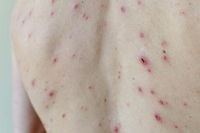Parents across the United Kingdom are set for a significant change in the new year: from January 2026, all young children in England, Wales, and Scotland will be offered a free chickenpox vaccine as part of the National Health Service’s (NHS) routine immunisation programme. This move, which has been hailed as a "hugely positive moment for families" by NHS England’s national director for primary care and community services, Amanda Doyle, aims to protect millions of children from the sometimes severe complications of chickenpox while also easing the burden on working families.
The new vaccine will be administered in two doses, at 12 and 18 months of age, and will be combined with the existing MMR jab—measles, mumps, and rubella—to create a new four-in-one shot known as MMRV (measles, mumps, rubella, and varicella). A catch-up campaign is also planned to ensure slightly older children do not miss out on this protection. Until now, parents wishing to protect their children from chickenpox have had to pay privately, often up to £200 for a full course, according to BBC and The Independent.
Chickenpox, caused by the varicella-zoster virus, is usually a mild childhood illness, but it can sometimes lead to severe complications. These include bacterial infections such as group A strep, swelling of the brain (encephalitis), lung inflammation (pneumonitis), stroke, and, in rare cases, death. According to Dr. Gayatri Amirthalingam, deputy director of immunisation at the UK Health Security Agency (UKHSA), "Most parents probably consider chickenpox to be a common and mild illness, but for some babies, young children and even adults, chickenpox can be very serious, leading to hospital admission and tragically, while rare, it can be fatal."
Health minister Stephen Kinnock echoed this sentiment, saying, "We’re giving parents the power to protect their children from chickenpox and its serious complications, while keeping them in nursery or the classroom where they belong and preventing parents from scrambling for childcare or having to miss work. This vaccine puts children’s health first and gives working families the support they deserve."
The economic impact of chickenpox is not insignificant. The Department of Health and Social Care estimates that chickenpox leads to £24 million in lost income and productivity every year in the UK, as parents are forced to take time off work to care for sick children. The rollout of the vaccine is also expected to save the NHS £15 million annually in treatment costs, reports The Independent.
Scotland’s Health Secretary Neil Gray confirmed that the vaccine will be offered in tandem with the rest of the UK, stating, "In line with recommendations from the Joint Committee on Vaccination and Immunisation, the chickenpox vaccination will be available to children in Scotland from January 2026. We plan to offer the vaccine in tandem with the rest of the UK and are working closely with Public Health Scotland and NHS Boards in Scotland to deliver this and give every child the best possible start in life."
This UK-wide rollout follows a recommendation from the Joint Committee on Vaccination and Immunisation (JCVI) in November 2023. The UK has lagged behind countries such as the United States, Germany, Australia, and Canada, all of which have included the chickenpox vaccine in their childhood immunisation schedules for years. Professor Adam Finn, a paediatrician and former JCVI member, noted, "Chickenpox is a rotten illness that is often thought of as trivial. The vaccine means chickenpox is going to be a thing of the past in the near future." He explained that earlier concerns about the vaccine increasing the risk of shingles in adults have now been shown to be "much, much smaller—it’s almost non-existent."
Despite the clear benefits, the rollout comes at a time of growing vaccine hesitancy in the UK. New data from the UKHSA revealed that none of the main childhood vaccines in England reached the 95% uptake target in 2024/25. Only 91.9% of five-year-olds had received one dose of the MMR vaccine—the lowest level since 2010/11—and just 83.7% had received both doses, the lowest since 2009/10. Scotland has seen similar trends, with MMR uptake by age five at its lowest in a decade, according to Public Health Scotland.
Health minister Stephen Kinnock has been vocal about the challenges posed by misinformation and conspiracy theories, particularly on social media. He stated, "These conspiracy theorists, who are peddling this nonsense and rubbish, we’ve got to take them on, we’ve got to defeat them in our arguments and drown out the noise that they’re making." The government is working with schools, GPs, and public health authorities to launch national and local campaigns to boost vaccine uptake and combat misinformation. Kinnock told the BBC, "It’s our job as the government, and everybody else out there that is on the side of common sense and reason, to make this case and to win this battle against the conspiracy theorists, and misinformers and disinformers out there who need to be dealt with and need to be silenced."
Experts stress the importance of clear, evidence-based information. Professor Paul Hunter of the University of East Anglia warned that online misinformation is a key factor in declining vaccine rates: "I think there is a lot of misinformation around vaccines, particularly around the MMR vaccine. They are seeding doubts into people’s minds that probably wouldn’t have been there before." Dr. Ben Kasstan-Dabush from the London School of Hygiene and Tropical Medicine advised parents to consult the NHS website or their GP for accurate information, rather than relying on social media.
Chickenpox is highly contagious and spreads easily among children. While most recover within a week or two, the illness can cause children to miss school or nursery and parents to miss work. In rare cases, children can experience severe complications. The vaccine’s introduction is expected to dramatically reduce both the number of chickenpox cases and the frequency of serious complications. Dr. Claire Cameron, Consultant in Health Protection at Public Health Scotland, described the addition of the varicella vaccine as "a welcome new addition to the routine childhood schedule and, as well as reducing the number of cases, will prevent more severe cases of chickenpox."
For those concerned about shingles, a related but distinct illness, the NHS already provides a shingles vaccine for adults turning 65, those aged 70 to 79, and those aged 50 and over with severely weakened immune systems. While people cannot catch shingles from someone with chickenpox, they can catch chickenpox from someone with shingles if they have never had chickenpox before. It is very unusual to get chickenpox more than once.
As the UK prepares for the largest expansion of its childhood immunisation programme in a decade, health leaders urge parents to take advantage of the new, free vaccine. The hope is not only to make chickenpox a thing of the past, but also to restore confidence in the broader vaccination system—ensuring healthier children, fewer hospitalisations, and less disruption for families across the country.


